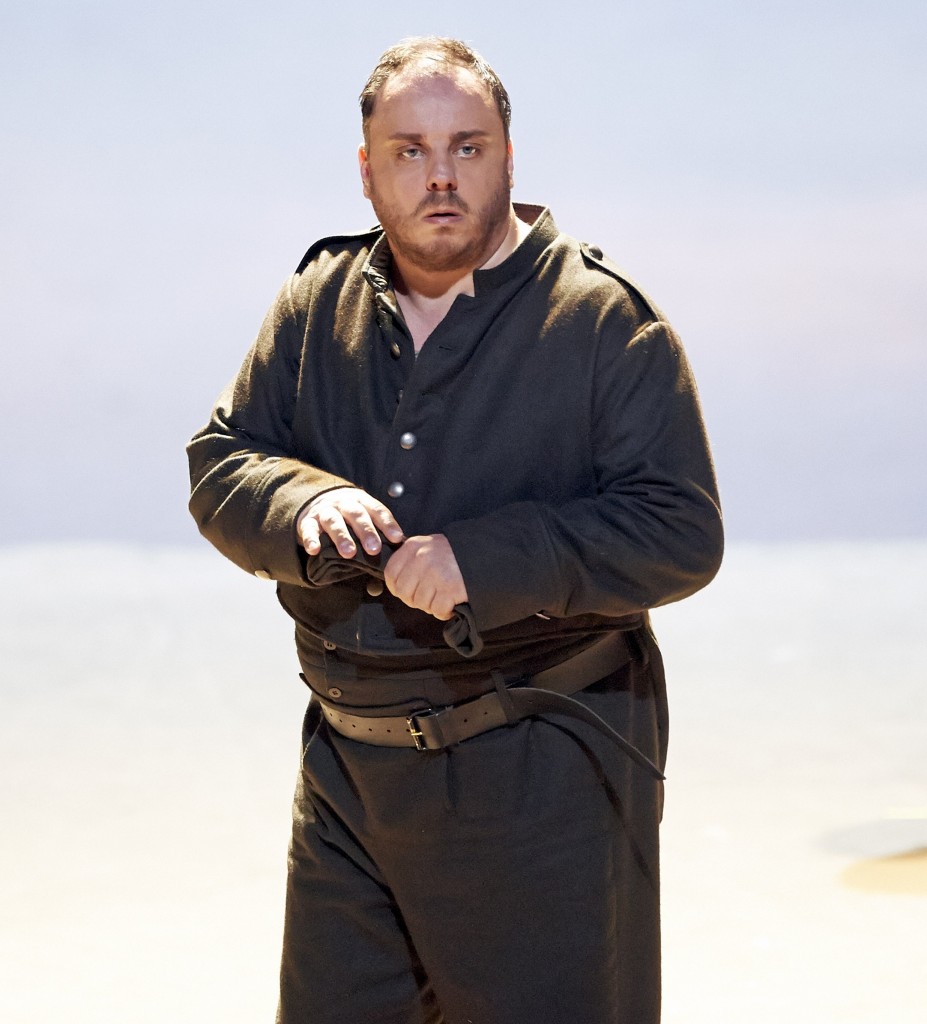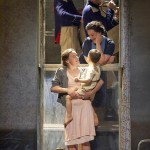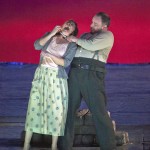 Late March in a stormy, cold Vienna, Spring has been postponed. Doom and gloom also on the stage of Vienna State Opera’s Berg’s Wozzeck. Alban Berg’s opera is based on George Buchner’s stage pieces concerning the (1821) criminal case of a barber who stabbed his woman to death. Wozzeck, a low-ranking soldier is forced to work privately for his captain , and volunteers for his doctor’s experiments, so he can support Marie and her child by him.
Late March in a stormy, cold Vienna, Spring has been postponed. Doom and gloom also on the stage of Vienna State Opera’s Berg’s Wozzeck. Alban Berg’s opera is based on George Buchner’s stage pieces concerning the (1821) criminal case of a barber who stabbed his woman to death. Wozzeck, a low-ranking soldier is forced to work privately for his captain , and volunteers for his doctor’s experiments, so he can support Marie and her child by him.
But Berg’s modernist opera -the first complete ‘atonal’ opera- is a work for our time, not just early 20th century, but recognisable now. Berg was moved by this man, ‘maltreated, spurned by the world, plagued by visions, who murders his lover, and drowns himself’. Berg’s opera – modernist-like Schnittke’s plays – tells the story through episodes, over 3 Acts , each five scenes. Berg’s music heightens the emotional atmosphere in these individual scenes, incorporating old and new musical forms. And (for 1925) its social realism radically depicts scenes from everyday life. An indictment of social injustice, Wozzeck ‘widened the notion of opera still living off stylised costumes and standardised characters.'(Schoenberg)
The Captain (Herbert Percoraro), pampered in the barber’s chair, waffles away with patronising advice. Wozzeck- so the Captain smothered in lather- ‘always looks so frantic’. A decent man with a clear conscience does everything …with control. Herbert Percoraro, a lyrical, high -pitched tenor, emits a manic laugh- against Mathias Goerne’s deep bass. Ja wohl, herr Hauptmann, Wozzeck repeatedly nods. Mathias Goerne has played the role of Wozzeck so often he now embodies the character. Physically, Goerne looks demonic; his large, staring eyes have a haunted look.
The Captain taunts him, Wozzeck has a child , unblessed by the Church: Wozzeck is a good man but has no morals (ein guter Mennsch, aber er hat kein Moral.) Wozzeck rebuts him ‘suffer the little children to come unto me.’ The law of God, poor people don’t see it. Morals! We are poor people; try practising your morals with no money. Goerne, standing glowering over the Captain waves his razor menacingly. Pecora rejoins, he’s a good man, but he thinks too much – often repeated of Wozzeck (the lower classes’ thinking could lead to revolution.)
This brooding violence re-emerges in the following hunting scene. Wozzeck tells Andres the place is ‘haunted’: the story -almost comical – how one evening a head came rolling down, someone thinking it a hedgehog.
 Marie (Scene 3) watching a military band from her window, sees the Drum Major. He glances after her: soldiers are handsome fellows. ‘Come boy, you’re just a whore’s son,’ she sings. She’s a pretty maid, but she has no husband. As Marie, Evelyn Herlitzius is a ravishingly expressive soprano.
Marie (Scene 3) watching a military band from her window, sees the Drum Major. He glances after her: soldiers are handsome fellows. ‘Come boy, you’re just a whore’s son,’ she sings. She’s a pretty maid, but she has no husband. As Marie, Evelyn Herlitzius is a ravishingly expressive soprano.
Their home resembles a shack in a southern U.S. movie – Depression era. Wozzeck looks in through the window – a striking contrast to the Drum Major. Wozzeck sings of his visions, ‘There was shape in the sky, all glowing. It came after him!’ (She goes to look after her son.) Herlitzius, tremendously powerful, rails, ‘This man’s obsessed, he didn’t even look at his child.’ All this thinking is driving him mad. And, desperately, ‘God , what it is to be poor.’ She can’t bear it any more. She’s frightened.
Wozzeck’s other way of earning money: the Doctor (Wolfgang Bankl). Doesn’t he give him three groschens a day! Has he eaten his beans? See, you’re philosophising again. (‘You see in nature…) Wozzeck is on all fours, like a dog. Bankl’s white-jacketed doctor is a chilling forerunner to a Nazi War Camp doctor. Wozzeck mistakes the Doctor’s interest in his visions for human sympathy. But Bankl triumphantly declares,’You’ve got a perfect mania- a classic case. Just keep being good.’ With his hypothesis, he’ll be famous.
In the scene between the The Drum Major and Marie, the Major (Herbert Lippert) appears at Marie’s s door. She mocks his swagger. He forces himself on her. She fights him off- like a wild animal. Then, unable to resist him, they copulate.
Opening Act 2 , Marie is with her boy. Again the expressionistic painted stage set, grey with cloudy abtract shapes in black; or are they dirt-engrained walls? Marie tries to hide the earing ‘she found’. Wozzeck interrogates her- ‘it must be gold?’- but relents. Plaintively Goerne sings , ‘Nothing but drudgery under the sun. We even sweat as we sleep.’ But he offers his pay and money he’s earned on the side. She sings, I’m not a good person. What a world! She could kill herself. Herlitzius, overwrought, affecting, is sensational.
The Doctor and Captain’s meeting in the street is comical. The strutting Captain (Bankl) in a top hat looms over the Captain (Percoraro), who, breathless, is trying to catch him up. ‘Permit me to save one life! Here’s you, bloated, fat, subject to aploplexy…’
Wozzeck, what’s your hurry. You charge through life like an open razor!‘ They mock him over his wife’s affair with the Drum Major. (The Captain admits he was once in love too.) But Goerne pleads with harrowing pathos, she’s all in the world he’s got. ‘God in heaven, it almost makes you want to hang yourself.’ To the Doctor,’He’s a rare specimen, this Wozzeck.’
Wozzeck confronts Marie, hints at her affair: her red lips have no blisters. ‘You were with him!’ -‘What if I was?’-‘You bitch!’ He’s about to strike her, but Goerne, again philosophical, sings movingly on the human condition, ‘Man is an abyss. It makes you dizzy looking all the way down.’
Wozzeck is outside a cheap tavern, brandy-soaked. It’s effectively staged, soldiers dancing with local women, huddled together on a cramped raised platform. Berg’s music seems to subvert the waltzing rhythms. He walks in, as Marie and the Drum Major appear and openly flirt, kissing passionately. The dance ends, Wozzeck’s about to go over. Goerne sings he’s comfortable here; but death would be as comfortable. Earthly things are in vain…Everything rots away; then, hiccupping, ‘his soul stinks’ . A fool cavorts: why is the world sad.
In the soldiers’ barracks, there are lines of men’s bodies either side of the stage. Wozzeck can’t sleep, sees flashes, hears the refrain ‘Oh, God, lead us not into temptation.’ The Drum Major bursts in, picks a fight with Wozzeck and brutally strikes him. He’s left bleeding and brooding.
Opening Act 3 Marie is sitting in her room , desperately seeking consolation in her bible, identifying with Mary Magdalene seeking forgiveness. Then- the stage set excellent -an expanse of flint grey water and skies. Marie and Wozzeck are walking by the ‘pond’. Wozzeck sings enigmatically,’you won’t need it in the morning. ‘
There’s a horrid moment as Herlitzius jerks- like receiving an electric shock- and topples. Goerne sings of how red the moon is… He has cut her throat. No one else can have her. Tot! A tremendous wailing sound emanates from the orchestra; a long sustained note, hellish drums, an ominous knocking.
We see Wozzeck sitting at the entrance to a tavern, a hole cut out of the expressionistically painted wall. Wozzeck, drunk, clings to a woman, with his bloodied arm. (No shoes, she can go barefoot into hell.) They all come out, repelled by the blood on his hands.
Wozzeck returns to the pond. ‘Alles still..still und tot.’ Wading in, he sings incoherently, Marie, what is that red band around your neck? But the red moon will betray him. He can’t find the knife; imagines himself all bloody, as if washing himself with blood. (The Doctor and Captain, passing, think they can hear someone drown.)
The final scene shows children playing. Does the boy know about Marie:’Your mother is dead, out there by the pond.’ The boy is seen fading into the expanse of blue cloud: perhaps the outsider, philosophising.
Wozzeck is the victim of a modern, ‘capitalist’ society- poor, down-trodden, exploited; and psychotic, driven mad. If Wozzeck has to be experienced, this current production could hardly be bettered. Directed by Adolph Dresen, Herbert Kapplmueller’s staging, evocative, atmospheric, is not distracting. The cast distinguished, Berg’s orchestration is endlessly fascinating, and to hear it performed by Vienna State Opera orchestra (conducted by specialist Dennis Russell Davies), a privilige. P.R. 23.3.2014
Photos: Featured image Evelyn Herlitzius (Marie); Mathias Goerne (Wozzeck); Evelyn Herlitzius (Marie) and Monika Bohinec (Margret); Mathias Goerne (Wozzeck) and Evelyn Herlitzius (Marie)
(c) Wiener Staatsoper/ Michael Pӧhn
viennaoperareview.com
Vienna's English opera blog

Thanks for your interest! If you are considering starting your own site, or blog, I would strongly recommend using WordPress. For me, and many other aspiring writers, their platform, which is constantly being updated by enthousiasts, has been invaluable.